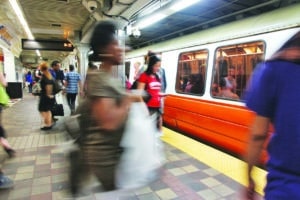Fallout from last week’s Red Line derailment can now include a new push to change the MBTA’s governance structure.
By the time the MBTA’s Fiscal and Management Control Board wraps up its work next year, officials hope to have established another group to succeed it. But how that next board will be composed remains a subject of debate. Boston Mayor Marty Walsh reignited a debate over that topic Monday when he wrote on Twitter that he wants the city to have a designated representative on the oversight board. This came after the mayor demanded the MBTA halt its planned fare increases following last week’s Red Line delay. The board’s members declined to halt the increases at a meeting Monday.
“Boston is most impacted by the failures of the @MBTA,” Walsh tweeted. “It’s our residents, our workers & our commuters who feel the pain. Yet we do not have a seat at the table when decisions about the T are made.”
The current board, convened by Gov. Charlie Baker and the legislature in the summer of 2015 after widespread service disruptions that winter, consists of five members all selected by the governor, three of whom also sit on the Department of Transportation board. In 2017, Baker and the legislature extended the board’s charter so that it will run through 2020.
The governor said Monday he plans to file legislation “later this year” to create a successor group, but defended the current model as one that has allowed for Boston and other communities served by the MBTA to be part of the process.
“There are a lot of communities that depend on the MBTA,” Baker said. “Boston, of course, is one, and their voices can and are heard pretty regularly around these issues. The board as it’s currently constituted, by almost any measure, has worked extremely well in terms of creating a very public and transparent way of doing business and moving an entity that was moribund when we took office to a better place.”
Baker pointed out that Boston, like other communities, has representation on the MBTA Advisory Board, a separate entity. Freshman lawmakers earlier this year filed a bill that would add two members to the FMCB, one representing Boston’s subway and bus passengers and the other representing commuter rail riders.
The FMCB and the MBTA are currently struggling to figure out just what caused last Tuesday’s Red Line derailment.
The investigation is zooming in on parts of the 50-year-old train car that went off the rails after ruling out operator error, foul play and faulty track infrastructure as possible causes of Tuesday’s derailment, MBTA General Manager Steve Poftak told the FMCB Monday.
The derailment last week was the fifth on an MBTA passenger train this calendar year, not the fourth as officials had previously said, and the 24th since the start of 2015.
While some progress has been made – repairs on the track, third rail and switch are complete, and trains are once again running from Alewife to Braintree continuously without requiring passengers to switch – Poftak warned that significant damage to the signal system will continue to slow down travel by 20 to 30 minutes.
Poftak had earlier announced that LTK Engineering had been contracted to conduct a review of all MBTA derailments since the start of 2017, and he said Monday the firm’s report would be ready for public release within three months.
Officials also moved to launch a second analysis Monday, one that will examine safety across the MBTA system. Advocates had called for that review, and although Poftak stressed that the trains and buses are safe, he said it would be a worthwhile idea to help rebuild public trust.







